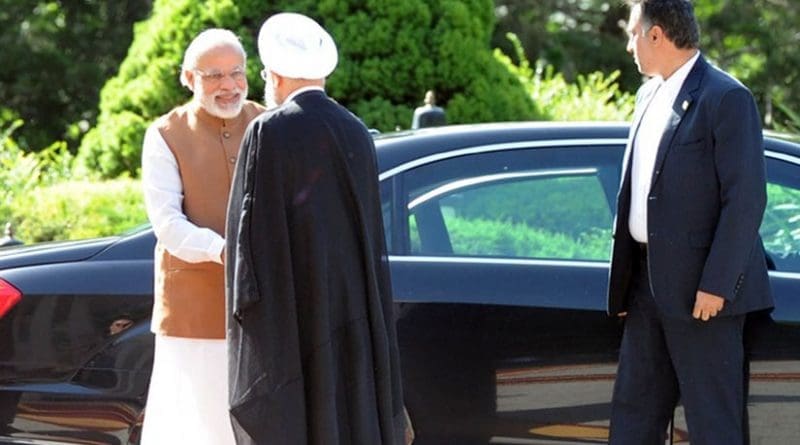Rouhani’s India Visit: Setting Next Stage In Bilateral Relations – OpEd
Iranian President Hassan Rouhani’s three-day visit to India is highly crucial in giving a new momentum in bilateral relations and thus fostering closer trade and non-trade cooperation between New Delhi and Tehran. At a time of deteriorating security in neighboring Afghanistan, rising tensions between Iran and Israel as well as uncertainties regarding the future of Iran nuclear accord, which raises the specter of a US exit from the deal potentially affecting India’s banking and trade ties with Iran, President Rouhani and Prime Minister Narenda Modi indeed have much to discuss with respect to both near-term and long-term issues on the India-Iran agenda.
For India, which is seriously lagging behind China’s ambitious trans-regional strategy, Rouhani’s visit is a landmark occasion to evince a coherent West Asia economic strategy that centers on deepening trade and energy security ties and fostering “connectivity,” in light of the recent operationalization of the India-financed Chah Bahar project — that is viewed as part and parcel of a broader (North-South) transportation corridor.
Building on the successes of Modi’s 2016 Tehran visit, when some 12 Memorandum of Understanding (MoU) were signed between the two countries covering a host of energy, commercial, cultural and other issues, thus marking a new “post-sanctions” phase in the bilateral ties that had suffered due to the international sanctions on Iran, Rouhani’s visit is likely to yield positive results in resolving some of the present problems, such as disputes over the Farzad gas field, which has resulted in mutual “pressure tactics” that are unhealthy and need to be replaced with an enhanced mood for bilateral cooperation and joint investments, e.g., in developmental and railway projects.
Indian companies have expressed interest in investing in the Arvand Free Trade Zone, which can be beneficial not only to Iran but also Afghanistan, Iraq, and Syria. The two countries are also finalizing the details of a free trade agreement, which is in the interests of both nations, nowadays similarly experiencing the problems of insufficient job growth, slow growth and stiff foreign competition, not to mention the problems of terrorism and Afghanistan’s dangerous insecurity; the latter casts a dark cloud on the trilateral Iran-India-Afghanistan cooperation that has a definite security rampart, given the fact that goods between Iran and India must go through several Taliban-controlled or Taliban-contested areas.
India is, hypothetically speaking, a perfect interlocutor between Tehran and Washington on Afghanistan and, for sure, Modi can play an effective mediating role with Trump’s White House on this matter if he wishes to do so, particularly since in addition to Taliban, Afghanistan is increasingly plagued by the growing presence of ISIS terrorists.
Over the years, India has worked assiduously to sustain its relationship with Iran in the face of pressures by US and its regional allies opposed to Iran and, in all likelihood, will continue to do so irrespective of any US move to scrap the nuclear deal; such a move will create a wedge between US and Europe, which favors the deal and has benefited from it, and, inevitably, India will likely behave independently following the Europeans’ footsteps, instead of appeasing the US in its efforts to isolate Iran.
For Iran, on the other hand, it is important to receive New Delhi’s assurance that the recent decision to curtail oil imports from Iran is “non-political” as officially stated and is due to the confluence of, among others, a slow economy and discounted imports from Iraq. Iran’s India supplies catapulted to the 3rd spot in 2017, after Iraq and Saudi Arabia, and Iran’s oil minister has expressed optimism that Iran’s energy trade with India will continue its post-sanctions healthy pattern unimpeded.
Also, Iran is looking forward to increased financial transactions with India’s banks, in light of the fact that big European banks continue to hesitate to engage with Iran in the new milieu out of fear of US reprisals. Hence, it is a litmus test of India’s (non-aligned) foreign policy in order to get past the present hurdles in Iran-India relations and mutually achieve a concrete next stage in their growing bilateral relations.

